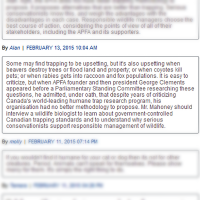
Whether they’re simply people who enjoy causing havoc or actual trolls – those who work for an industry and try to derail conversation – it can be a major headache. And we’re not the only ones who think so.
News organizations and other media groups are now limiting or removing commenting sections entirely.
Popular Science, the century-old science and tech magazine, is one of the many who have pulled commenting from their news articles. In an explanatory blog, Suzanne LaBarre explained they even conducted some studies to find out if their theories were correct.
“Simply including an ad hominem attack in a reader comment was enough to make study participants think the downside of the reported technology was greater than they'd previously thought,” she wrote. “If you carry out those results to their logical end–commenters shape public opinion; public opinion shapes public policy; public policy shapes how and whether and what research gets funded–you start to see why we feel compelled to hit the ‘off’ switch.”
In a discussion with media expert and host of Rogers’ TV show Wits and Pieces, Jody Matheson agreed that online commenting is no longer meeting its original goal.
“Comments online are meant to build community, and foster discussion,” he said. “Sadly, commenting has taken on a Wild West attitude of aggressive attacks against counter opinions. There is no debate, or sharing of facts in an intellectual way. A comment online isn't going to change opinion. Only an open mind will do that.”
Many websites have now begun ‘hiding’ their comment section, or requiring a lengthy sign up process. But despite these changes, trolls still find their way in.
A good example is a Hamilton Spectator article in which The Fur-Bearers was featured. A user by the name of ‘Alan’ went on a rant about an anecdote from over 30 years ago. Not only did it not provide an opportunity for us to properly respond and balance out that information, but the individual did not reveal who they are. Our presumption, based on experience, is that it was Alan Herscovici, mouthpiece for the Fur Council of Canada – something that warrants disclosure.
In the case of animals, this creates a massive issue. The true science that is readily available can be disputed by those with no experience, knowledge or expertise. Particularly when conflict occurs, it means that fear and hate can be increased without being appropriately monitored or challenged.
Online commenting may have started with good intentions. But trolls have ruined it for the rest of us – and the animals.
Work like our growing Living With Wildlife campaign is only possible with the support of monthly donors. Please consider become a monthly donor – for as little as $10 a month – and help us create a Canada that co-exists.

